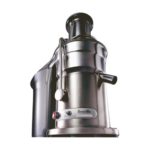When we were researching what juicer to get, we came across posts by people claiming that centrifugal juicers (like the Breville juicers) heated the juice to the point where the health benefiting enzymes were destroyed.
There are many types of enzymes used throughout the body.
About Digestive Enzymes:
Digestive enzymes are enzymes that break down polymeric macromolecules into their smaller building blocks, in order to facilitate their absorption by the body.
Digestive enzymes are found in the digestive tracts of animals (including humans) and in the traps of carnivorous plants, where they aid in the digestion of food, as well as inside cells, especially in their lysosomes, where they function to maintain cellular survival.
Digestive enzymes are diverse and are found in the saliva secreted by the salivary glands, in the stomach secreted by cells lining the stomach, in the pancreatic juice secreted by pancreatic exocrine cells, and in the intestinal (small and large) secretions, or as part of the lining of the gastrointestinal tract.
Source Wikipedia: Digestive Enzymes
But at what temperature are enzymes destroyed (or denatured)?
Most enzymes can be denatured—that is, unfolded and inactivated—by heating or chemical denaturants, which disrupt the three-dimensional structure of the protein. Depending on the enzyme, denaturation may be reversible or irreversible.
Source Wikipedia: Enzyme
Lots of sites out there throw around the number 118 degrees Fahrenheit as the point where enzymes break down, but find the figure was a little more difficult. Human enzymes however begin to denature at about 40 degrees Celsius or 104 Fahrenheit (Wikipedia: Enzyme Assay). So starting around 104 to 118 Fahrenheit enzymes can start to unfold and cease to do their job.
Some say that the enzymes are destroyed anyway in the digestive process, but many of the digestive enzymes found in the human body can also be found in food. Still, there are plenty of health benefits from fruit and vegetable juices.
Do Breville Juicers Heat the Juice Destroying the Enzymes?
Let’s say you want those enzymes from food intact (not destroyed), does a centrifugal juicer (like the Breville Juicers) destroy the enzymes?
Thanks to a study by the Australian Government National Measurements Institute, we can see that on average for the test fruits and vegetables that the temperature of rise caused by juicing is 1.2 degrees Fahrenheit.
The starting temperature for the vegetables and fruits was about room temperature or 73 degrees.
Raising 1.2 degrees doesn’t come anywhere close to 104 or 118.
Would have been helpful in our Search
 The study would have been helpful when we were looking for a suitable juicer for our home. We decided to go with Breville’s Juice Fountain Elite.
The study would have been helpful when we were looking for a suitable juicer for our home. We decided to go with Breville’s Juice Fountain Elite.
Now, it’s great to have data to back up the idea that the centrifugal juices work so fast that they don’t heat up the juice enough to hurt enzymes.
If you’re looking for a juicer, you can check out our list of the Top 10 Juicers here.
